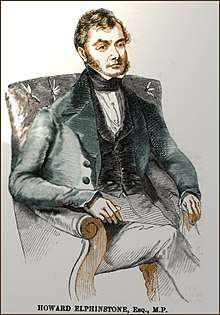Sir Howard Elphinstone, 2nd Baronet
Sir Howard Elphinstone, 2nd Baronet (9 June 1804 – 16 March 1893)[1] was a British Whig politician

He was elected as Member of Parliament (MP) for Hastings at the 1835 general election, having unsuccessfully contested the seat in 1832.[2] He did not stand for re-election in Hastings at the 1837 general election, but stood instead in Liverpool, where he did not win a seat.[3] He returned to the House of Commons at the 1841 general election, when he won one of the two seats in Lewes. He did not stand again in 1847.[4]
He was elected a Fellow of the Royal Society in June 1832.[5]
Family
Elphinstone was the son of Lt.-Gen. Sir Howard Elphinstone, 1st Baronet (1773–1846) and Frances Warburton (died 1858). He was a barrister, and had the degrees of MA and Doctor of Civil Law (D.C.L.). He married Elizabeth Julia Curteis, in 1829, and they had two children.[6]
He succeeded to his father's baronetcy in 1846, and on his death was succeeded by his son Howard Warburton Elphinstone (1830–1917).[6]
References
- Leigh Rayment's Historical List of MPs – Constituencies beginning with "L" (part 2)
- Craig, F. W. S. (1989) [1977]. British parliamentary election results 1832–1885 (2nd ed.). Chichester: Parliamentary Research Services. p. 146. ISBN 0-900178-26-4.
- Craig, op. cit., page 191
- Craig, op. cit., page 183
- "Library and Archive Catalogue". Royal Society. Retrieved 30 November 2010.
- Lundy, Darryl. "Howard Elphinstone". ThePeerage.com. Retrieved 24 January 2010.
External links
- Hansard 1803–2005: contributions in Parliament by Sir Howard Elphinstone
| Parliament of the United Kingdom | ||
|---|---|---|
| Preceded by John Ashley Warre Frederick North |
Member of Parliament for Hastings 1835 – 1837 With: Frederick North |
Succeeded by Joseph Planta Robert Hollond |
| Preceded by Viscount Cantelupe Henry Fitzroy |
Member of Parliament for Lewes 1841 – 1847 With: Summers Harford to 1842 Henry Fitzroy from 1842 |
Succeeded by Robert Perfect Henry Fitzroy |
| Baronetage of the United Kingdom | ||
| Preceded by Howard Elphinstone |
Baronet (of Sowerby) 1846–1893 |
Succeeded by Howard Elphinstone |